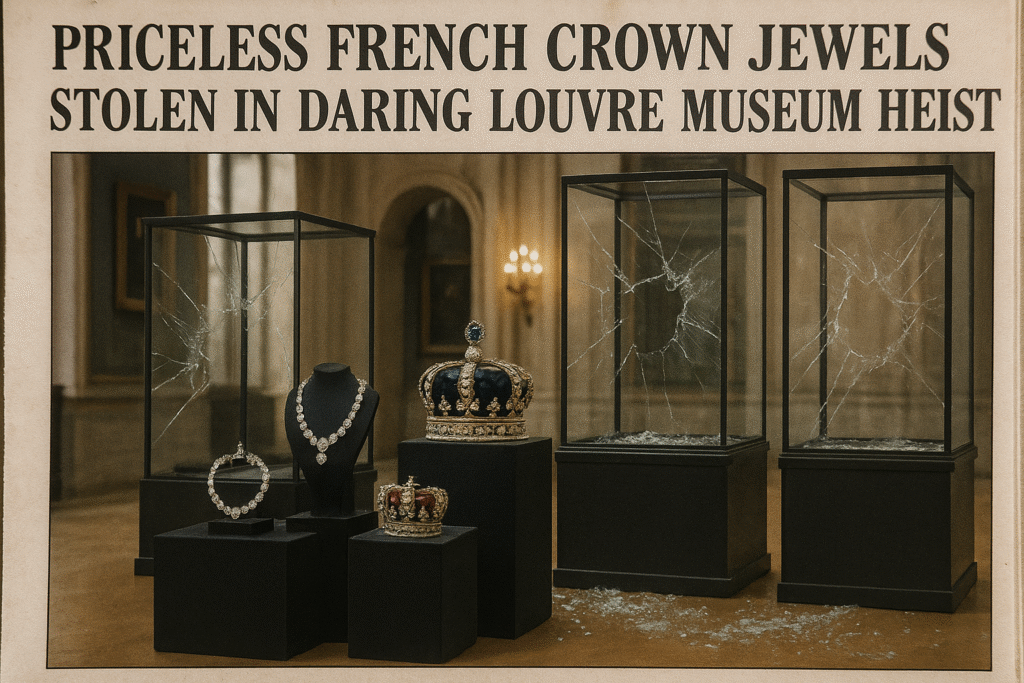By Harshit, Paris, October 19, 2025
The world-renowned Louvre Museum in Paris was forced to close its doors on Sunday following a bold daylight robbery that saw thieves make off with priceless French Crown Jewels and other royal artifacts. The heist, which took place in the museum’s famed Apollo Room, has sent shockwaves through France and the global art community.
A Swift and Sophisticated Operation
According to French Interior Minister Laurent Nuñez, the robbery unfolded with military precision early Sunday morning. Speaking to France Inter, Nuñez revealed that a group of “three or four” masked perpetrators infiltrated the museum using a freight elevator mounted on a truck positioned outside the building. Once inside, they broke through a window using an angle grinder and stormed the Apollo Room — the lavish gallery that houses the French Crown Jewels and Louis XIV’s legendary hardstone vessel collection.
“The operation lasted no more than seven minutes,” Nuñez said. “Clearly, this was an experienced and well-prepared team that knew exactly what they were doing.”
The minister confirmed that the robbers escaped on high-speed motorcycles waiting nearby, disappearing before law enforcement could respond. Surveillance footage from the museum and surrounding streets is now being analyzed by French police and anti-theft specialists from the Ministry of Culture.
Priceless Treasures Lost
The Apollo Room, designed by Charles Le Brun in the 17th century, is among the Louvre’s most visited and symbolically significant halls. It contains centuries-old royal treasures that represent the history of the French monarchy, including crowns, tiaras, gemstones, and regalia once worn by French kings and queens.
While officials have not yet released a full inventory of stolen items, Nuñez said that the jewelry taken has “sentimental and cultural value that is beyond price.” Early reports suggest that several crown jewels and a gold brooch encrusted with diamonds were among the stolen pieces.
Minister of Culture Rachida Dati, who visited the scene within hours of the robbery, confirmed that no injuries occurred during the incident. “This is a devastating blow to our national heritage,” she said in a statement on X (formerly Twitter). “The investigation is ongoing, and we are determined to recover these treasures and bring the perpetrators to justice.”
The Louvre Closed Amid Security Investigation
In a rare move, the Louvre announced it would remain closed “for exceptional reasons” while security teams assess the damage and review museum safety protocols. Museum officials have been working closely with French police, art crime experts, and the Interpol Art Crime Unit to track the stolen artifacts.
The Louvre, which houses world-famous works such as Leonardo da Vinci’s Mona Lisa and Eugène Delacroix’s Liberty Leading the People, is the most visited museum in the world. In 2024, it welcomed 8.7 million visitors, with American tourists comprising 13% of total guests — second only to local French visitors.
The closure has left many visitors stranded outside the museum gates, with long lines of tourists expressing shock at the audacity of the theft.
A Pattern of High-Profile Museum Heists
Art crime experts say the Louvre robbery echoes several recent high-profile heists across Europe, where sophisticated gangs have targeted museums with weak overnight security. Similar cases include the 2019 Green Vault heist in Dresden, Germany, and the 2021 theft of Dutch masterworks from small European galleries.
“This appears to be the work of a professional art theft ring,” said Jean-Paul Merlet, a retired investigator from the French National Police’s Art Crime Division. “They likely had insider information about the museum’s security routines, timing, and weak points.”
Authorities have not ruled out the possibility of an inside collaborator who may have provided access or detailed schematics of the museum layout.
Hope for Recovery
Despite the gravity of the theft, French officials remain optimistic. “We will find those responsible and recover the stolen artifacts,” Interior Minister Nuñez vowed. “France’s cultural heritage is not for sale.”
Experts warn that the jewels may be difficult to sell on the black market due to their unique provenance and high visibility. Many expect the perpetrators to attempt to dismantle or re-cut the jewels to avoid detection — a move that would irreversibly damage their historical value.
For now, the Louvre stands silent — its gilded halls closed to the public, its legacy of royal splendor momentarily darkened by one of the most daring museum robberies in modern history.

